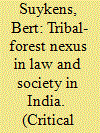| Srl | Item |
| 1 |
ID:
144918


|
|
|
|
|
| Summary/Abstract |
Approaches and instruments focused on market mechanisms and private enterprises, including private protected areas, are promoted as ways to resolve global environmental and developmental problems. In Indonesia, Ecosystem Restoration Concessions (ERCs) have been developed as a new market-oriented governmental instrument to counter current deforestation processes and to restore forest ecosystems. Conservation and development organizations, along with state authorities, view ERCs as a highly promising instrument in Indonesia and in other countries as well. Experiences with ERCs are still limited, however, and their viability is uncertain. The implementation of ERCs in Indonesia has been controversial and the impact of ERCs on forests and forest-dependent communities has been fiercely disputed. This article explores these conflicts and disputes with a focus on the Harapan ERC and weighs the relevance of ERCs for German development cooperation. The improvement of the accountability of such projects and the implementation of mediation facilities are emphasized as prerequisites to establishing such market-oriented instruments according to international standards of nature conservation, the rights of indigenous and local populations, and sustainable development. The author concludes that decisions about strategies and instruments applied in forest-related development cooperation must involve a reconsideration of the mindsets that currently determine conservation approaches and development cooperation.
|
|
|
|
|
|
|
|
|
|
|
|
|
|
|
|
| 2 |
ID:
183558


|
|
|
|
|
| Summary/Abstract |
India is enhancing domestic coal production to provide affordable electricity to its people even as it is committed to the responsible use of coal in power plants incorporating the latest clean coal technologies. However, the current regulatory framework for coal mines in India entails a multiplicity of laws, overlap of jurisdictions, duplicity of procedures and inadequate enforcement of environmental laws, which do not augur well for the sustainable development of India's energy security. Harmonization of laws, policies, procedures, and authorities engaged in mining, forest, and environmental governance of coal mines is critical to achieving India's Sustainable Development Goals. This paper examines the legal provisions related to environmental regulation of coal mines in India to identify the thorny issues in the extant regulatory framework. We then propose a comprehensive regulatory framework that includes the constitution of an independent Coal Mines Environment Authority to minimize the adverse environmental impact of coal mines through an integrated approach that will enhance the effectiveness, efficiency, and transparency in the environmental governance of coal mines. The paper outlines the composition and functioning of the proposed Authority which may provide pointers for other coal-producing countries seeking to improve the environmental regulation of their coal mines.
|
|
|
|
|
|
|
|
|
|
|
|
|
|
|
|
| 3 |
ID:
090592


|
|
|
|
|
| Publication |
2009.
|
| Summary/Abstract |
This article examines two conflicting narratives concerning the relationship between tribals and forests in India-narratives that have been counterpoised in India at least since colonial times. The first narrative sees tribals as the natural protectors of the forest; the second argues that tribal practices are detrimental to forest conservation. The author investigates how these two representations of Indian tribals have shaped and are still shaping legal and societal relations between tribals and forests. The author shows how these narratives are deeply embedded in Indian forest legislation and how local officials, rights activists, and tribals themselves all make selective use of the two narratives to gain or deny access to forest resources.
|
|
|
|
|
|
|
|
|
|
|
|
|
|
|
|